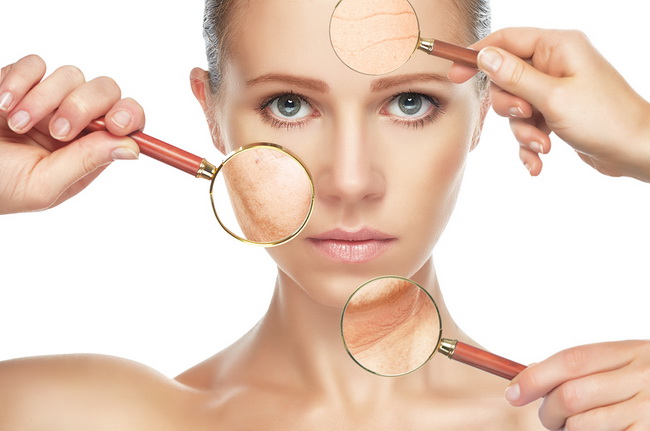- Make It Yourself Lavender Heart-Shaped Bath Bombs!
- 20 Things You Never Knew About “Down There”
- 12 Best Foods For Those Suffering From Arthritis Pain
- 12 Personal Hygiene Mistakes Almost Everyone Makes (Mom Never Told You About #4!)
- 15 Medicinal Plants And Herbs From The Cherokee People
- 12 Mind-Blowing Benefits Of Drinking Coconut Water During Pregnancy
- 12 Outstanding Winter Foods That Won’t Fatten You Up Like A Christmas Turkey
Top 12 Reasons Some People Look Older Than Their Actual Age

Photo credit: bigstock.com
It happens to everyone eventually. One day you look in the mirror and realize that you aren’t going to be 25 forever. You will suddenly see a wrinkle, an age spot, or some scaly, dry patches that were never there before. This is when most people decide that they must start taking care of their skin.
Unfortunately, most of the skin damage you see in your 40s and 50s actually happened when you were in your teens and 20s. You can’t stop time, but you can stop some of the bad habits that cause premature aging, so that when you are 60, you won’t look 75.
We’ve all seen people like this. Their faces are usually tanned, and very lined, hard-looking, like a dried-out piece of leather. They look like an old boot that no one has taken care of. In many ways, this is true. They did not take care of their skin or look after their diet, and now they are paying the price. You are certain they must be in their late 40s or early 50s, but when you ask them their age, they tell you they are 38.
What causes this premature aging of the skin, and what can you do about it? We have made a list of the 12 worst offenders that you should avoid. Only one of them is out of your control; the rest, however, are up to you.
1. Overexposure To The Sun
Exposure to the sun is one of the biggest factors causing premature aging of the skin. This is why you see cowboys or construction workers with major aging of the face. Sun exposure accounts for about 70 percent of the skin aging process. The radiation from the sun ruins the collagen fibers in our skin via oxidation. Once the elastic fibers of collagen become hard and brittle, their basic structure is destroyed in a process called solar elastosis, and the skin becomes hard-looking and dried out.
This accelerated oxidation process also damages the genetic material in the cells of our skin and causes an abnormal division of the cells. This means excessive sun exposure can increase the risk of skin cancer as well as leading to tough, hard, rough, wrinkled skin. Although we all need some sun exposure for vitamin D, you don’t need to exposure your delicate facial skin to the sun. Wear a hat and sunglasses while you get your early morning sunshine, and avoid sun exposure when radiation levels are at the highest — usually between 10 and 3 p.m.
2. Excessive Sugar Consumption
If you have a sweet tooth, you most likely will show the signs of aging more quickly than you would like. When your blood sugar levels spike, it starts a process called glycation. This process can cause permanent damage to the collage of the skin. Once collagen becomes damaged due to glycation, your skin begins to show this damage via fine lines and wrinkles. Skin begins to lose its natural elasticity and firmness and begins to sag. Limit your sugar consumption, and find other ways to sweeten your life, such as fresh fruit.
3. Smoking
There are two major reasons why smokers look older than their age. The first things to show are the fine lines where the skin is very thin, such as the corners of the eyes and above the upper lip. This is due to the constant use of the muscles to pull a drag off of a cigarette. When you constantly pucker your mouth, those lines begin to make a permanent crease, like folding a piece of paper over and over again. The second reason lies in the lower levels of vitamin C in smokers’ blood, which is more than 60 percent lower on average when compared to non-smokers. Vitamin C is vital for the production of collagen in the skin, which keeps the skin supple and smooth. Once collagen disappears or is damaged, the skin begins to sag. Quitting is hard, we know, and there are a million good reasons to do so. Here is one more. Find a way to quit. Today.
Continue to Page 2

Photo credit: bigstock.com
4. Sleep Positions
Believe it or not, sleeping with your face pressed against the pillow forms small lines and wrinkles that will eventually become permanently etched on your face. Sleeping on your side will cause wrinkles to appear on the cheeks and chin area. Ideally, sleeping on your back is the best way to stop wrinkles that form from creases that occur when you sleep in other positions. However, sleeping on your back, for most people, means more snoring. Try to sleep on your back as much as possible and buy a satin pillowcase, which is easier on the skin, for the times that you are sleeping in other positions.
5. A Low-Protein Diet
A low-protein diet means that you are basically living on simple carbs, which your body turns into sugar. This can cause the connective tissues of the skin to become rigid and hard. Your body needs protein to make tissues that support the skin and keep it soft. Without protein, your body cannot produce elastin fibers, collagen, and hyaluronic acid, all of which are vital for the appearance of fresh, youthful skin. Eat more protein, especially complete proteins, for younger-looking skin.
6. Depression
You might not think that your state of mind has anything to do with the aging of your skin, but it does! Prolonged feelings of depression have been found in studies to cause a shortening of our telomeres, which are the very ends of our DNA strands. When our telomeres become shorter, this affects the DNA in every cell in the body, stopping the division of cells and premature cell death. This causes an accelerated gain of cells in the tissues of the body where cells divide rapidly and provide new growth. This would be the skin and hair. Depression also interferes with hormone production, increasing stress hormones. Many people with depression also neglect themselves in other ways, such as not eating properly, not getting enough sleep, and neglecting their personal hygiene. There are numerous ways you can naturally deal with depression. Try some of the many herbal supplements available (such as St. John’s Wort), or see your doctor if your depression is severe or has lasted longer than six months.
Continue to Page 3

Photo credit: bigstock.com
7. Poor Nutrition
Eating sufficient calories is not the same thing as providing your body with proper nutrition. In order to fight the effects of premature aging, your body needs plenty of antioxidants, which are found in abundance in fresh fruits and vegetables. Soluble dietary antioxidants such as beta-carotene, lutein, lycopene, and vitamin E are all found in fruits and vegetables. These types of antioxidants reach into the deepest layers of the skin, more than any cream or lotion could, and neutralize the damage that is caused by sun exposure and free radicals. Vegetables and fruits that are high in vitamin C also help the body make collagen. Berries, such as blueberries, strawberries, and raspberries, are all high in both vitamin C and antioxidants. Eat a diet rich in the foods provided by Mother Nature, including some type of berry every day for your most beautiful skin ever.
8. Excessive Alcohol
Although a moderate amount of alcohol (One drink per day for women and two drinks for men) is good for you and provides your body with health benefits, excessive alcohol causes damage to both the skin color and texture, especially around the eyes and nose. Excessive drinking causes permanent dark circles under the eyes, bulging eyes, a bloated face, and broken capillaries around the nose, giving it a rather red, bulbous appearance. Excessive drinking breaks down the tissues deep in the skin and causes permanent damage. Limit your alcohol intake, and save your skin from further damage.
9. Stress
Everyone experiences stress on some level, but chronic levels of high stress increase the production of stress hormones, such as adrenaline and cortisol, which accelerate the aging process. Stress hormones can inhibit the normal synthesis of connective tissue, cause damage to bone density, and cause other types of changes in the bone structure. Excessive, chronic stress can permanently alter your features! Learn to limit your stress and find ways to manage the stress you cannot avoid, such has through meditation or yoga.
Continue to Page 4

Photo credit: bigstock.com
10. Lack of Sleep
Your body repairs the skin and makes new cells while you sleep. When you are in the deepest stages of sleep, the pituitary gland makes growth hormones, vital for connective tissues and the renewal of skin. In fact, deep sleep is one of the few times your body makes these growth hormones. Although everyone has a sleepless night every now and then, prolonged lack of sleep leads to accelerated aging, among other health problems. Arrange your schedule so that you get between seven and nine hours of sleep most nights. If you have trouble falling asleep, try some chamomile or valerian tea about an hour before bedtime. Turn off all screens including computers, cell phones, tablets, and televisions, as these lights interfere with our sleep.
11. Facial Mimicry
By facial mimicry, we mean talking or using exaggerated facial movements. This is a trait that is often learned in childhood but it can be unlearned. Intensive and repetitive use of facial muscles while talking brings out exaggerated lines on the face that will make you look older than your actual age. One example is the frown line on the forehead. Most people have either several horizontal creases across the forehead or one or two vertical creases near the eyes. Repetitive frowning can cause frown lines to start appearing in the late 20s if not corrected. Watch yourself in the mirror or film yourself talking on the phone and see if you are guilty of overusing some facial expressions. Although some permanent lines, such as laugh lines, cannot be eliminated entirely, you can delay the appearance of some lines by limiting any overuse of facial muscles, such as by frowning, pursing the lips, or smiling constantly.
SEE ALSO: 12 Anti-Aging Foods that Work Better than Botox (We Love #8)
12. Genetics
This is the one area that you cannot control, of course. Although our body has the ability to produce certain enzymes that work in the same way that antioxidants do, limiting the damage and repairing our DNA, genetic factors keep some people from making more of these enzymes than others. The tendency to repair genetic damage is inherent in our genome, so if your parents developed age spots or grey hair while they were in their 20s, chances are you will as well. So although you can’t change your genetics, you can find external ways to lessen the damage to your skin, such as by not smoking and getting plenty of rest, as well as by eating your way towards better skin by consuming more foods that have their own antioxidants. Your genes might not be up for repairing your skin like someone else might, but you can eat your own way towards better looking skin. Consume plenty of antioxidant rich foods such as organic fruits and vegetables every single day.
Right about now you are wondering why we haven’t mentioned water on this list. Although many sources will claim that drinking tons of water will give you softer, moister skin, the truth is, water will not prevent wrinkles. Wrinkles and other signs of skin aging are caused by the sun, genetics, smoking, etc. Although it is true that the outermost layer of the skin might become a bit dry if you are dehydrated, but there are no studies showing that drinking a great deal of extra water will turn dry skin soft and supple. Every organ in the body needs water to function, so yes, be sure you get in your 8 glasses each day. But drinking a gallon of water each day will not give you younger looking skin.
You can’t avoid your birthday every year, but you can avoid the things that make you look like you have celebrated more birthdays than you actually have. Don’t forget, too, that a happy, positive, youthful outlook on life will shine from the inside out.
References:

































